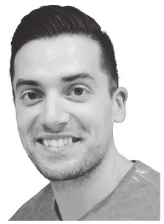David Maidment
David studied at Cardiff University, graduating in 2008 with a BSc degree in Applied Psychology. As part of his degree, David completed a one-year professional placement at Great Ormond Street Hospital and University College London (UCL) Institute of Child Health. During his time in London, he worked with children diagnosed with high-functioning autism, as well as patients with memory and language impairments. David then went on to complete an MSc (2009) and PhD (2013), funded by an Economic & Social Research Council 1+3 studentship. Under the supervision of Dr. Bill Macken, he explored how different modes of speech interact in verbal short-term memory.
After his PhD, David worked as a Research Associate within the Auditory Learning team led by Dr. Sygal Amitay at the MRC Institute of Hearing Research. The aim of his research was to develop more effective training programmes that could be applied to the treatment and rehabilitation of disorders associated with auditory processing.
Throughout his studies, David has also undertaken a number of volunteer roles. He has worked with children with autism as part of the National Autistic Society’s befriending scheme, as well as in adult mental health services at Cardiff and Vale University Health Board (Whitchurch Hospital/Park Road Rehabilitation Unit) and Nottinghamshire NHS Trust (Rampton Hospital). David worked briefly as an Independence Worker for the Mansfield, North Nottinghamshire based charity Jigsaw, offering support to vulnerable people over the age of 60 with dementia.
In his current role as a Research Fellow within the Mild-to-moderate hearing loss group, David now intends to bring together his diverse experiences and expertise. He hopes to develop novel, patient-centred intervention strategies, for patients to overcome loss of social activity and participation arising from difficulties in their hearing.
Expertise Summary
David’s main expertise is Cognitive Psychology, specifically learning and memory in humans. His previous research has focused on verbal short-term memory, auditory perceptual organisation (i.e. auditory streaming/‘grouping’), lip-reading, and audiovisual speech processing in both children and adults.
He has extensive experience of conducting behavioural/psychoacoustic experiments on auditory training and learning, including designing and implementing new paradigms, recruiting and testing participants, and analysing data. He has knowledge of advanced statistical methods and analysis, which he has taught formally at undergraduate and postgraduate levels.

